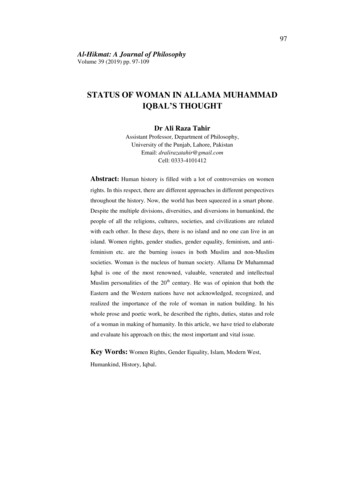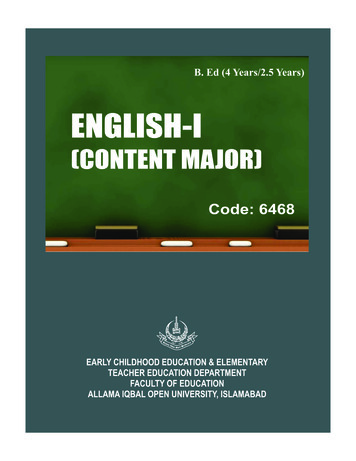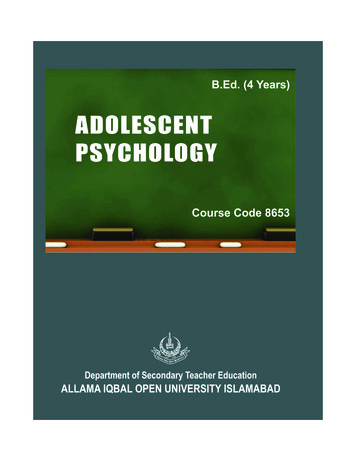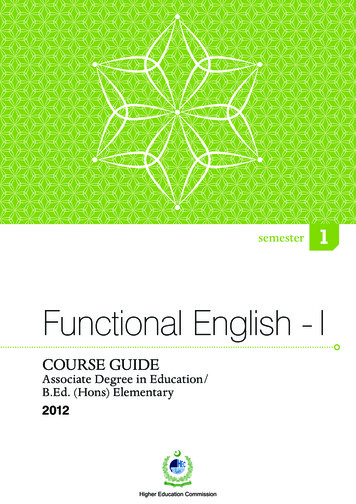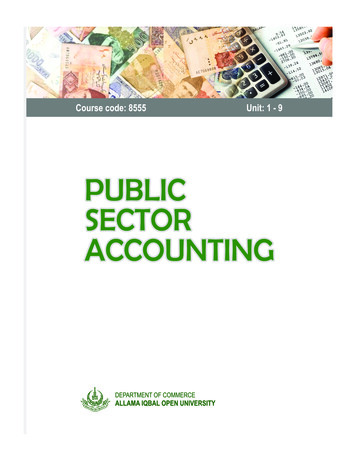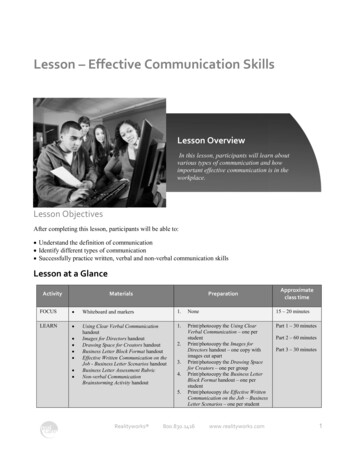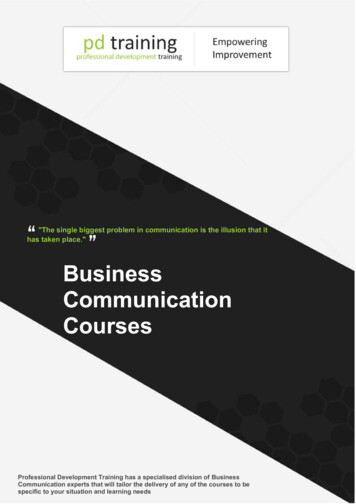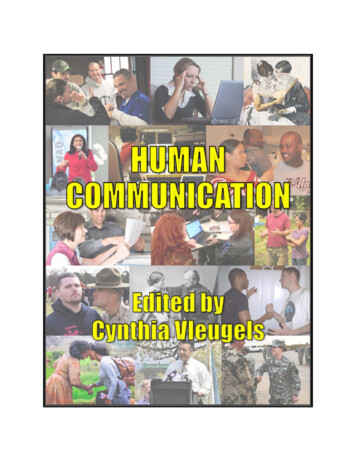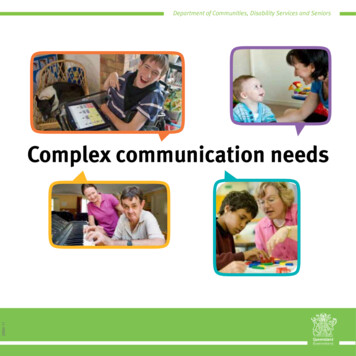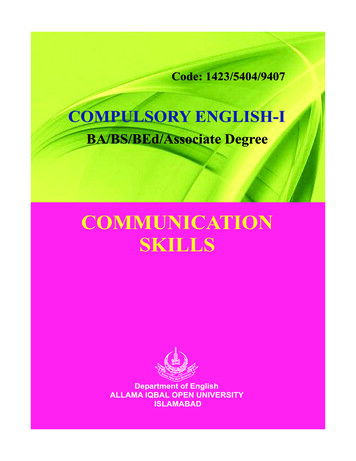
Transcription
Code: 1423/5404/9407BA/BS/BEd/Associate DegreeCOMMUNICATIONSKILLS
UNIT 1FUNCTIONSTRUCTUREREADINGWRITINGLISTENINGAsking and Answering QuestionsSimple Present and Present Continuous TensesGuessing the Meaning of WordsWriting Connected SentencesUnderstanding DirectionsUNIT 2FUNCTIONSTRUCTUREREADINGWRITINGLISTENINGSeeking ConfirmationThe Present Perfect TenseSynonyms and AntonymsInformal lettersListening to a Lecture and Taking NotesUNIT 3FUNCTIONSTRUCTUREREADINGWRITINGLISTENINGAgreeing and DisagreeingThe Simple Past TensePredicting the content of a bookLetters of ApologyListening to the NewsUNIT g Possibility and ImpossibilityModal VerbsSkimming and ScanningLetters Giving AdviceGiving adviceUNIT 5FUNCTIONSTRUCTUREREADINGWRITINGLISTENINGUNIT 6Expressing Certainty and UncertaintyExpressing ObligationActive and Passive VoiceFunctions in the textWriting Formal Letters: JobApplicationsListening to Job Interview
FUNCTIONSTRUCTUREREADINGWRITINGLISTENINGExpressing PreferenceExpressing IntentionSimple Future TenseMain Ideas and Supporting DetailsParagraph DevelopmentListening to AnnouncementsUNIT 7FUNCTIONREADINGWRITINGLISTENINGAsking PermissionGiving and Refusing PermissionSTRUCTUREFuture ContinuousGeneral Reading ExercisesWriting an EssayListening to a SpeechUNIT g Appreciation, Admiration, Pleasure andGratitudeIndirect or Reported SpeechMaking InferencesDescriptive WritingListening to DescriptionsUNIT 9FUNCTIONSTRUCTUREREADINGWRITINGLISTENINGAdvice & SuggestionsClauses: Main or Independent Clause Dependent orSubordinating ClauseFacts & OpinionsNarrative WritingListening to a Story
UNIT 1Section AFUNCTIONAsking and Answering QuestionsA young man Yaasir has been stopped for over speeding. A Policeman is asking himsome questions. Listen to the conversation between them on your cassette recorder.Recorded Text 1Policeman:Yaasir:P:Y:P:Y:P:Y:P:May I know your name please, sir?What?Your name, please?Oh, yes. Yaasir Malik.And your address?Hmmm?Your address, sir, where do you live?Uh. 45 Margalla Road.And your age? How old are you?
Y:P:Y:21.Have you got your driving licence, sir?No, not at the moment. Can I bring it to the police stationlater?It's at home.Certainly, sir. What make is this car?It’s a Toyota Corolla.And what year is it?2006.How long have you been driving?About five years.Have you ever been stopped by the police before?No, never.P:Y:P:Y:P:Y:P:Y:Let’s repeat the questions that the Policeman asked Yaasir: May I know your name please, sir?Your name, please?And your address?Your address, sir, where do you live?And your age? How old are you?Have you got your driving licence, sir?What make is this car?And what year is it?How long have you been driving?Have you ever been stopped by the police before?There are many ways of asking questions in English but the most frequently usedquestions asked in English language begin with the letters WH, except the questionword How? To ask a WH question correctly in English, we must put the WH word infront. Read these examples of WH questions: WHEN .? TimeWhen did they go to Peshawar? - Last year. WHERE .? PlaceWhere did they stay in Peshawar? – In a guest house WHY .? ReasonWhy did they go to Peshawar? - Because they wanted to visit some old friends WHAT .? ObjectWhat did they buy from Peshawar? – Some beautiful brass and copper items
WHICH .? Choice of twoWhich item did she like best? - The one that's made of copper WHOSE .? Possession.Whose bag was the heaviest? – Jamal’s WHOM .? Person /sWhom did they meet? – The Durrani’s WHO .? PersonWho took their order at the restaurant? - The waiter HOW .? MannerHow did they travel to Peshawar? By car
Exercise 1Mrs Siddiqui has justgrandson is going to get married in awants to know all about the girl, so shequestions. In the columns below, theanswers are all mixed up.heard that herfew days. Sheasks a lot ofquestionsandCan you match the questions given inthe correct answers in the column 2?column 1 withColumn 1Column 21 What's her name?2 Where does she live?3 How old is she?a Of course she does.b He’s an Engineer.c I think she's verybeautiful.d She’s tall and slender. She has long,black hair, large brown eyes and abeautiful smile.e Yes, three.f Salma.g Of course she'll livehere.h Yes, she has.i 20.j In Peshawar.4 Has she finished college?5 What does her father do?6 Does she have any brothers?7 Is she pretty?8 Does she speak Urdu?9 What does she look like?10 Will she come and live in Lahore?Exercise 2What questions will you ask to get the following answers?Question:Answer:?Salma.Question:Answer:?In Peshawar.Question:Answer:Question:Answer:?20.?Yes, she has finished college.Question:Answer:?He's an engineer.
Question:Answer:?Yes, three brothers.Question:Answer:?She's very beautiful.Question:Answer:?Of course she speaks Urdu.Question:Answer:?Yes, she will come and live in Lahore.Question:Answer:?She is tall and slender and has long, black hair.In this Unit we will look closely at eight different ways of asking questions inEnglish. Let us first learn the rules.Question type IStatement:Question:She is pretty.Is she pretty?Please note that in this type of question, the subject ‘she’ of the statement and the verbto be ‘am, is, are, was, were’ are inverted, changed round or reversed.Exercise 3Read the following answers and write appropriate questions byreversing the sentence structure. Follow the rule given above in question type 1.Question:Answer:?They are English.Question:Answer:?Anjum was here.Question:Answer:Question:Answer:?They were at home.?Salima was the best student.Question:Answer:?I am from Pakistan.
Question type 2Statement:Question:She has finished school.Has she finished school?Statement:Question:They can come tomorrow.Can they come tomorrow.This type of question is similar to type 1. The subject of the sentence ‘she’ and ‘they’ andthe auxiliary or helping verbs ‘has’ and ‘can’ are reversed.Exercise 4Form questions from the following answers by following the type 2 rulesgiven above. You may notice that there are different auxiliary verbs used, but you canfollow the same rule. Follow the example.Question:Answer:Can he take it to the station ?He can take it to the station.Question:Answer:?She will come to Karachi.Question:Answer:?She has bought a new car.Question:Answer:?They will go for Hajj this year.Question:Answer:?Arjumand can tell her.Question type 3StatementQuestionHe likes coffee.Does he like coffee?If there are no verb 'to be' and no auxiliary verb in the sentence then we use ‘do, does ordid’ to form a question.Statement:Question:He went to SialkotDid he go to Sialkot?
Statement:Question:They need a car.Do they need a car.Exercise 5Form questions from the following statements or answers:Question:Answer:Question:Answer:Does she come from Peshawar ?She comes from Peshawar.?I enjoyed that film.Question:Answer:?I like this music.Question:Answer:?Roohi wants to come.Question:Answer:?Fahad ate all the cake.Exercise 6You are helping a woman fill in the visa application form. She does notunderstand the questions. You must make the questions easier for her by repeatingthem in a different way.Example:Home address: What is your home address? Where do you live?12345678910Name in full:Home address:Nationality:Age:Marital status:Purpose of visit:Place of birth:Date of birth:Length of visit:Date of return:?Question type 4Statement:Questions:She has three brothers.Does she have any brothers?Statement:She has got three brothers.
Question:Has she got any brothers?In the first sentence (She has three brothers) 'has' is not an auxiliary verb. It is the mainverb of the sentence. There is no auxiliary verb in the sentence. Therefore, thequestioner uses do, does or did. This is like a type 3 question.In the second sentence (She has got three brothers), 'has' is an auxiliary verb. Therefore,the subject of the sentence ‘she’ and 'has' can be inverted to form a question. Has she got three brothers? or, Has she got any brothers?(The meaning of both sentences is the same.)Exercise 7Follow the question type 4 rule and then write questions for the followinganswers.Question:Answer:?Saeed has a good job.Question:Answer:?Mr Saeed has got two children.Question:Answer:?They have got a new car.Question:Answer:?We had a very large house in Karachi.Be careful!We can say: He has a large house orHe has got a large houseBut when we are talking about the past, we only use 'had' and not, ‘had got’. Forexample: We had a large house in Karachi, notWe had got a large house in KarachiTherefore the question form must be: Did you have a large house in Karachi? but not
He is having a big houseQuestion type 5Statement:Question:Jamal told me about the film.Who told you about the film?Who is used to ask about the subject of the sentence when the subject is human.Exercise 8Now follow the question type 5 rule and form questions from thefollowing n:Answer:?Zayed ate all the cake.?Uzma rang me last night.?My husband repaired the car.Question:Answer:?Mr and Mrs Haq visited us.Question type 6Statement:Question:The film frightened him.What frightened him?What is used to ask about the subject of the sentence when the subject is not human.Exercise 9Form questions from the following sentences:Question:Answer:?The heavy rain destroyed the crops.Question:Answer:?The storm woke me up.Question:Answer:?A tree fell on the car.
Exercise 10 GEO TV had an interesting reality show titled ‘George Ka Pakistan’. It isabout George, a Britisher, who tries to settle down in Pakistan and become a Pakistaniandtherefore George travels and explores hisadoptedcountry and its people. He is trying tounderstandthe complexities of Pakistani society and todiscoverwhat it means to be a Pakistani, all on his ownwithastrict budget and very little assistance.George isstaying at ahotelinKarachi. He istalking to aWaiter in thehotel. TheWaiter’sEnglish is not very good so he makes a lot of mistakes,his mistakes or incorrect expressions are marked withan asterisk (*). Listen and read their conversation andthen correct the waiter's bad English.Recorded Text :*Where you from?From England.*When you arrive here?Last night.*How long you stay in Karachi?I'll be here for about a week.*you like Karachi?Yes, I do. It's a very interesting place.*You been here before?Yes, I have.*How many times you been here?Oh, just once.*You fly from London?Yes, but I was in Islamabad for a few days first.*You businessman?Yes, I am.*You married?No.*How many family members you got?My parents.
W:G:*You no have brothers sisters?No.Question type 7Statement:Question:Number 120 bus goes there.Which bus goes there?Statement:Question:Anjum's father died.Whose mother died?Which and whose are used to ask about part of the subject of the sentence.Compare: Ayesha’s mother died.Ayesha’s mother died.Who died?Whose mother died?Exercise 11 Keeping the question type 7 rule before you write questions for thefollowing answers. Keep the bold word in mind before writing the question.Question:Answer:?Anjum’s son won first prize.Question:Answer:?Anjum 's son won first prize.Question type 88(a) He broke the window.I met Ali’s father.I met Ali's father.I drove the office car.I spoke to Ali's father.What did he break?Who did you meet?Whose father did you meet?Which car did you drive?To whom did you speak?Which, what, who, whose and whom can be used to ask about parts of the sentenceother than the subject.
Exercise 12 Follow the question type rule 8a carefully and then form questions for thefollowing answers using the appropriate question form.Question:Answer:?He stole my father's watch.Question:Answer:?Pakistan beat India by 94 runs.Question:Answer:?He broke the world record.Question:Answer:?He broke the world record.8(b) He came last week.He lives in Karachi.He cried because his motherleft.He opened the door with a key.When did he come?Where does he live?Why did he cry?How did he open the door?Exercise 13Now write questions for the following answers. Notice the word in bold.Question:Answer:?He came by bus.Question:Answer:?He bought it in New York.Question:Answer:?I saw Ayesha last week.Question:Answer:?I like him because he is honest.8(c) Mr Akhtar came yesterday.I met Akhtar.My expensive vase broke.Who came yesterday?Whom did you meet?What broke?
Section BSTRUCTUREThe Simple Present and Present Continuous Tenses1The simple present is used to describe an action, an event, or conditionthat is occurring in the present, at the moment of speaking or writing. The simplepresent is used when the precise beginning or ending of a present action, event, orcondition is unknown or is unimportant to the meaning of the sentence.Each of the highlighted verbs in the following sentences is in the simple present tenseand each sentence describes an action taking place in the present: 2The simple present is used to express general truths such as scientific fact, as inthe following sentences: 3Rectangles have four sidesPakistan Day takes place on March 23The moon circles the earth once every 28 daysThe simple present is used to indicate a habitual action, event, or condition, as inthe following sentences: 4The wife waits patiently while the husband books the ticketsThe shelf holds three books and a vase of flowersThe crowd moves across the auditorium in an attempt to see the film starBoth sisters are very talented; Romana writes and Naumana paintsMy father goes to play tennis every Saturday eveningMy grandmother sends me new clothes each springThe play ends with applause by the crowdWhile the simple present and the present continuous tenses are sometimes usedinterchangeably, the present continuous or progressive tense emphasises thecontinuing nature of an act, event, or condition.Each of the highlighted verbs in the following sentences is in the present continuoustense. Nauman is looking for the paperback editions of all of Harry Potter booksDolly is dusting all her book shelvesThe agitating factory workers are gathering in front of the factoryFM 100 is broadcasting the hits of the 60s & 70s this evening
The simple present tense is one of the most common tenses in English. There are onlytwo basic forms for the simple present tense; one ends with -s and the other doesn't.Here are the rules, using the example verb ‘sing’:SubjectVerb FormExampleIsimple formI singYousimple formYou singHeSimple form SHe singsSheSimple form SShe singsItSimple form SIt singsWesimple formWe singTheysimple formThey singIn other words, only third person singular subjects (he, she and it) have to have a verbwith -S.-S or -ES?With most verbs, the third person singular form is created simply by adding -S.However, with some verbs, you need to add -ES or change the ending a little. Here arethe rules:Verb ending in.How to make the 3rd person singularExamplesAdd -ESHe passeszAdd -ESShe dozes
shAdd -ESShe wisheschAdd -ESHe watchesconsonant yChange Y to I, then add -ESIt flies[anything else]Add –SHe singsExercise 141Choose the correct simple present tense verb.I in a bank.WorkWorksWorkes2She in Faisalabad.LiveLivesLivees3It almost every next day in Bhurban.RainRainsRaines4We to Quetta every summer.FlyFlysFlies5My mother eggs for breakfast every morning.Fry
FrysFries6The bank at four o'clock.CloseClosiesCloses7Jameel very hard in class, but I don't think he'llpass the course.TryTrysTries8My life is so boring , I just TV every night.WatchWatchiesWatches9My best friend to me every week. (write)WriteWritiesWritesExercise 15 Read a small passage about Ajmal and Shagufta who work in the sameoffice. Choose the correct form of the simple present tense verbs that are given in thebrackets.I and Shagufta (work) in the same office,but we are completely different.She(like)coffee,butI(love) tea. I (wash) my carevery weekend, but she never (clean)hers. She (smile) all the time at work, but I(feel) miserable. I (complain)about the boss all the time, but she (think)
the boss is a nice person. When I (finish) work, I like to go out with myfriends, but Shagufta(go) straight backhome. The boss(think) Shagufta is a good worker.Exercise 16 Choose the correct simple present tense verbs from the box and then usethem in its appropriate blank spaces.brushcombeaton ringswake upget dressedwear drinkget upgotakemakepick up putEvery weekday morning I as soon as my alarm After 10minutes I and go to the bathroom. I a shower,myteethandmyhair.Later I my makeup and , I usuallyshalwar kameez with sandals or shoes. Next I usually go to the kitchen andmyself breakfast, I sometimes coffee instead of tea. Forbreakfast I often cornflakes, toast and marmalade and apiece of fruit. After breakfast I my car keys and towork.The Present Continuous Tense[AM / IS / ARE] [VERB ing] I am watching TV He is learning the French languageThe present continuous tense is formed using two components: the verb BE in thepresent tense, and the -ING form of a verb. Here are the rules, using the example verb‘sing’:SubjectBE-ING FORMIAmsingingYouAresingingHeIssingingSheIssinging
ItIssingingWeAreSingingTheyAreSingingHow to make the -ING formWith many verbs, you can simply add -ING to the end of the verb. However, with someverbs, you need to change the ending a little. Here are the rules:Verb ending in.How to make the -ING formExamplesswim swimminghit - hittingget - getting1 vowel 1 consonantDouble the consonant, then add ING1 vowel 1 consonant ERemove E, then add -INGcome - cominglose - losinglive - livingAdd -INGsay - sayinggo - goingwalk - walking[anything else]Now let us learn when and how to use the present continuous tense. Read the followingrules carefully:Use 1NowWe use the present continuous tense to express an action that is happening now, atthis very moment. It can also be used to show that something is not happening now. You are learning English nowI am sitting
I am not standingThey are reading their booksThey are not watching televisionWhat are you doing?Why aren't you doing your homework?Use 2LongerActionsinProgress NowIn English, ‘now’ can mean‘this second’,‘today’, ‘this month’, ‘this year’, ‘this century’ and so on. Sometimes we use the presentcontinuous to say that we are in the process of doing a longer action which is inprogress; however, we might not be doing it at this exact second. Use 3I am studying to become a doctorI am reading the book Gulliver’s TravelsI am not reading any books right nowAre you working on any special projects at work?Aren't you teaching at the University now?Near FutureSometimes, speakers use the present continuous to indicate that something will orwill not happen in the near future. 1To describe an event, activity or situation that happened in the past for a period oftime. 2I am meeting some friends after workI am not going to the party tonightIs he visiting his parents next weekend?Isn't he coming with us tonight?On Sunday, I was walking for three hoursTo describe an event, activity or situation happening in the past at the same timeas another event happened. 3Hamid was speaking to Masood when Javed arrivedTo describe a scene or situation in a story or report. It was snowing and the trees were looking beautiful when the
accident happened.4To describe habitual or often repeated events. 5Verbs of ‘thinking’ such as: to believe, doubt, forget, know, mean, to think,remember, understand do not have an ‘ing’ in the end and they remain thesame. 6 While I was speaking to Javed, I wanted to be watch myfavourite TV programme ( NOT was wanting)At the dinner party, I hate the noise sometimes people make(NOT was hating)Verbs of ‘possession’ such as: to belong, have, own, want also do not have an‘ing’ in the end and remain the same. 8I believed what he said ( NOT was believing)I remember the good old days often ( NOT was remembering)I know that person very well. ( NOT was knowing)Verbs of ‘feeling’ such as: to dislike, hate, like, love, want, wish also do nothave an ‘ing’ in the end and remain the same. 7The tourists climbed K2 three times in three monthsWhen he was in America, Bilal owned a big car ( NOT wasowning)Particular verbs such as: to appear, cost, need, prefer, recognise, see, meet, seem,taste, weigh so not have an ‘ing’ in the end. All last year, sugar cost 45 Rs per kilo (NOT was costing)When I met my friend after ten years, I failed to recognize him (NOT wasfailing)Exercise 17 Create a sentence in the present continuous tense by arranging the wordsin a proper order.1 She / wear / earrings2 It / rain / today.3 I / have / good time.
4 They / wait / train.5 I / study.6 We / walk.7 We / plan / our work.Exercise 18Write sentences with present continuous tense.1What is he doing?2What are they doing?3What are they doing?4What is she doing?5Whatishedoing?Exercise 19 Whichtense,simpletense will be suitable in the following1present or present continuoussentences?Right now Daniyal is .sleepsleepssleeping2They to some music on the radio.are listeninglisteninglisten3in ghosts?Believe you
Do you believeAre you believing4Daniyal, this book belong to you?isdoesare5Bilal, to me?do you listenare you listeningare you listen6What about right now?do you thinkare you thinkingare you thinksMy mother breakfast every morning at 7:00.7makesis makingmake8What book at the moment?are you readare you readingdo you readExercise 20 All of the following sentences should be completed using the simplepresent or the present continuous tenses. You must use the words in the brackets to fillin the blanks.Example: Right now, I (sit) am sitting at my deskEvery Monday, Sami (take) takes his children to the cricket ground
123456Shhhhh! Be quiet! Abbu (sleep) .Don't forget to take your umbrella. It (rain) .I hate living in Murre because it (rain) a lot there .I'm sorry I can't hear what you (say) because everybody(talk) so loudly.My teacher (write) a book about his adventures inAfghanistan.Do you want to come over for dinner tonight. Oh, I'm sorry, I can't. I (go)to music concert tonight with some friends.Section CREADINGGuessing the Meaning of WordsMany learners of English get worried or confused when they come across adifficult word. They want their teacher to translate or explain every word they do notknow, or they look up for meaning of every unknown word in a dictionary.Dictionary is a great tool! But if you rely too much on a dictionary then you would notbe able to become an efficient and fast reader. You need to infer or guess the meaningsof words through the context or situation in which it is placed.The meaning of many unknown words can be inferred or guessed from the context orperspective of the passage. It is very important to learn how to guess the meaning ofunknown words when you read. If you do not, your reading will be slow and difficultand you may be so worried about the meaning of individual words that you may missthe general meaning of the paragraph or the passage that you are reading.Let us do some exercises that will help you learn to guess word meanings throughcontext. The following is a newspaper report. This report contains a number of wordsprinted in italics which you might not know. Read it carefully and see if you can guessthe meaning of these words from the context of the passage.
Bangkok. Jan. 24 A police spokesmantold reporters that an unidentified manhad knifed six foreigners in the backhere yesterday. The victims were onlyslightly injured.Extra uniformed and plainclothedpolice have been deployed in variousresidential areas and tourist-spots totrack down the man.Eyewitnesses said that the assailantwas in his early 20s, had fair skin and shorthair and wore glasses. One of the victimssaid he did not see his assailant but felt asharp knife thrust into his left side.'I hailed a taxi and went to thehospital', he said.Exercise 21 Here is a list of fifteen words from the above newspaper report in column1 and also a list of dictionary definitions of these words in column 2. Can you matcheach word with the correct definition?Column 1Column 21 spokesman2 unidentifieda to push suddenly and with forceb part of a town consisting of privatehousesc little; a bit; ratherd to find someone or something by hunting or searchinge to call out to someonef a person who sees an event happeng someone (or something) whose name we do not knowh a person who speaks for or represents others officiallyi to stab with a knifej an attackerk someone who suffers pain, hurt or deathl to place or position people especially soldiers or policemanin a particular way for actionm dressed in a certain type of clothes which all members of agroup wearn hurto wearing ordinary clothes on duty3 to knife someone4 victim5 slightly6 injured7 uniformed8 plain clothed9 to deploy10 residential11 to track down12 eyewitness13 assailant14 to thrust15 to hailExercise 22 In the newspaper report, you must have noticed how a noun‘a knife’ can also be used as a verb. Now here are some more sentences, in eachsentence there is one word written in bold. These words or verbs are derived from veryfrequently used nouns. Guess their meaning.123The nurse wheeled the patient into the operating room.Children like these pills because they are coated with sugar.It's very stuffy in here. I think we should air the room.
45678910They first cornered the rat and then caught it.The politician worded his reply very carefully.He was a small boy when I saw him last. I can't picture him as a father now.Thousands of people lined the streets.It is not easy to bone a chicken before you actually cook it.The president chaired the meeting.We chalked the names on the wall.Exercise 23 Think of names for different parts of the body which can be used as verbsas well as nouns? For each word that you can think of, write two sentences.Example:Head He has a big head. (Noun) He heads a large company. (Verb)Read the following newspaper report.Security for Foreigners TightenedIn a move to enhance security of foreigners and counter terrorist attacks, the federalgovernment has established a special cell in the ministry of interior to deal with thescrutiny of foreigners working or residing in Pakistan. All the law enforcement andintelligence agencies have been directed to share information with the cell to ensure thesecurity of foreigners working on different projects in the country.The government of Punjab has been directed to upgrade security for the 456 foreignersworking on 70 projects in the province. As part of the security plan, police and privateguards had been deployed at the residences and working places of foreigners. They havealso been asked to keep either police or private guards while travelling. The directiveswere given at a recent top level meeting in which the law and order situation of all theprovinces was reviewed.The Punjab government had taken some important steps to improve the law and ordersituation. It included the monitoring of heinous crime cases and sectarian activists.
Exercise 24 The following words or phrases can be used instead of the words printed inbold. Select the appropriate word or phrase from the list and complete the newspaperextract given servationdreadfulmake sureimproveSecurity for Foreigners TightenedIn a move to security of foreigners and terrorist attacks, thefederal government has established a special cell in the ministry of interior to deal withthe of foreigners working or residing in Pakistan. All the lawand intelligence agencies have been directed to share informationwith the cell to . the security of foreigners working on different projects inthecountry.The government of Punjab has been directed to security for the 456foreigners working on 70 projects in the province. As part of the security plan, police andprivate guards had been at the residences and working places offoreigners. They have also been asked to keep either police or private guards whiletravelling. The were given at a recent top level meeting in which the lawand order situation of all the provinces was reviewed.The Punjab government had taken some important steps to improve the law and ordersituation. It included the of crime cases and.Read an interesting personal account written by a young boy who had moved back toPakistan after years of living in Dubai. As you read it for the first time, underline anyword that you find difficult to understand. Then try and guess the meanings yourself
by finding clues from the context and finally look up the meanings of these words inthe dictionary.When my father told me that we would be shifting to Karachi, Pakistan, I didn’t know howto react. As the day of departure loomed in front of me, my sentiments changed. Nostalgicmemories of my past in Dubai started to linger in my mind. I was becoming homesick eventhough I was returning to my own coun
English. Let us first learn the rules. Question type I Statement: She is pretty. Question: Is she pretty? Please note that in this type of question, the subject 'she' of the statement and the verb to be 'am, is, are, was, were' are inverted, changed round or reversed.
